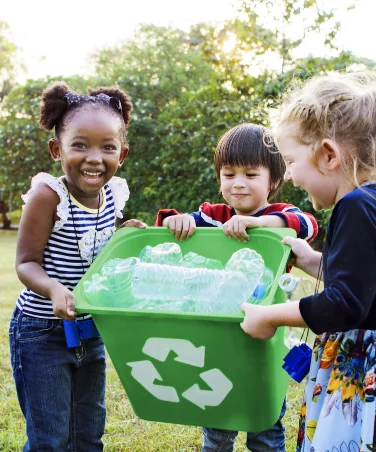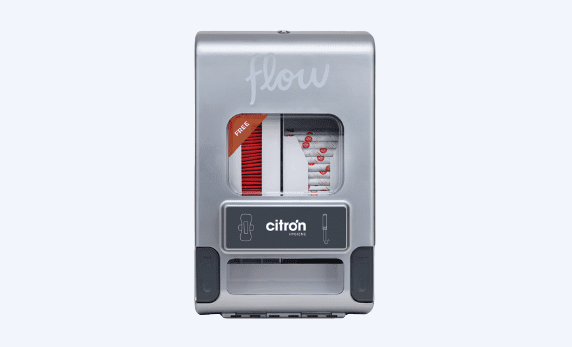How Citron Hygiene Is Supporting Environmenstrual Week 2023
As we go about our lives, businesses are becoming increasingly concerned about the impact of day-to-day tasks on the environment. But have you ever given thought to the environmental impact of your workplace washrooms?
Environmenstrual Week encourages a revolution for healthy-eco-friendly menstrual products, and an opportunity for us to tackle the stigma and shine a light on the impact of period plastic on the world.
We have pulled together our resources to give your business further insight into how you can encourage more environmentally friendly menstruation for staff and customers in the workplace, and beyond.



Founded by Wen in 2018, Environmenstrual Week is an annual week of action that helps to raise awareness of the environmental impact of period products and push for the legalisation against harmful chemicals and hidden plastic in menstrual pads and tampons. Wen’s mission is to ultimately help everyone access healthy and plastic free period products to manage their cycle, and in order to achieve this, they encourage others to help spread the word and amplify the conversation.
We encourage eco-friendly menstruation and sustainable disposal practices all year round and are continuing to shed light on this important subject throughout Environmenstrual Week. Here are just a few of the ways in which Citron Hygiene can help you make period positive changes this Environmenstrual Week.
Did you know almost 2 billion menstrual items are flushed down the toilet every year? This can have a detrimental effect on our sewer systems, causing blockages that often take weeks to clear. When a tampon doesn’t get caught up in a fatberg, it is likely to end in a body of water where it doesn’t belong, shored on beaches and riversides. At Citron Hygiene, we offer an extensive range of sanitary disposal solutions to help reduce the environmental impact of menstruators who are flushing their period products down the toilet. Deliver a great washroom experience for all, whilst encouraging sustainable menstruation practices.
Browse Citron Hygiene’s range of sanitary waste disposal bins.
According to Wen, more than 90% of menstrual pads are made up of 90% plastic. Whilst there are many different types of plastics, most of them have been found to release toxic chemicals that are unhealthy for you, and can lead to effects such as skin allergies and irritation to the nose, throat and lungs. Not only can they cause harm to you, but plastic products can take hundreds of years to decompose. For these reasons, we encourage businesses to offer more sustainable solutions, such as period pants, menstrual cups and organic pads and tampons.
The Aunt Flow Hygiene Products Vendor is the most efficient solution to provide menstrual products for free to employees, students, and guests. The pads and tampons are made with 100% organic cotton, without the use of synthetics, chemicals, or dyes. On top of that, the cartridges and individual wrappers are designed to use minimum packaging. For this reason, it’s no surprise that Aunt Flow was named the winner of the 2023 Metsa Tissue Sustainability Awards.
A single person will use approximately 10,000 sanitary pads or tampons in their lifetime, which either go into our oceans or end up in landfill. Learn the meaning of sustainable menstruation and how your business can encourage more sustainable practices in the workplace.
Rather than simply acknowledged as a normal bodily function, talking about periods is often considered rude or embarrassing. As individuals, and within your business, you can play your part in helping to tackle the stigma and make menstruation less of a taboo topic. Here’s how.
Tampons absorb liquid and don’t break down into smaller pieces like toilet paper does when flushes through your pipes. Flushing a tampon down the toilet can have a negative impact on our sewer systems and rivers and seas. Read our blog to learn how you can support period dignity in your washroom by providing safe sanitary disposal options for menstruators this Environmenstrual Week.
A fatberg is a large mass of solid waste found in a sewerage system, consisting of congealed fat and hygiene products that have been flushed down the toilet. The removal of fatbergs costs businesses and the general public millions each year through their water bills. Now’s the time to provide facilities in your business to prevent fatbergs, here’s how.
Managing a period goes well beyond the cost of a pack of tampons and the costs involved can all contribute to period poverty, an issue affecting an increasing number of people. Does your workplace cater to the needs of those who are menstruating? Our guide explores the true costs of periods.
We advocate for menstrual equity and period dignity. Learn about the three core initiatives that our social values focus on and how collectively, we can help create a period positive space in your business that is free from stigma, shame, and barriers to accessing hygienic period products to manage menstrual health.
As a business, you can play your part – whether you have a period or not!
Kickstart your journey to becoming a more inclusive space for all with Aunt Flow’s Free Vend Period Product Dispenser. Help to tackle period poverty, increase footfall and care for the planet by making the switch and offering free, organic pads and tampons to your washroom users.
Aunt Flow is trusted by these leading UK companies…









"(Required)" indicates required fields
"(Required)" indicates required fields